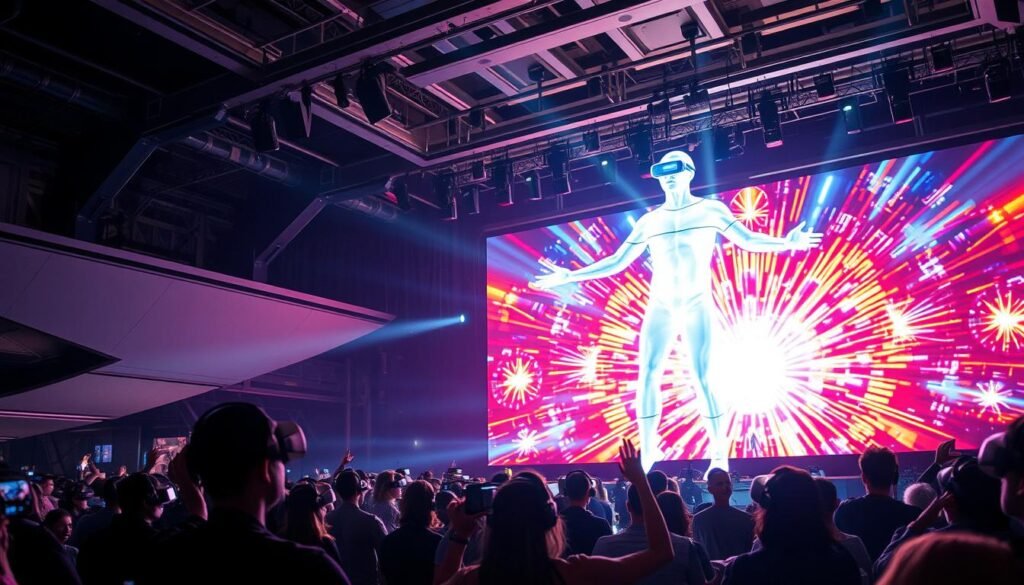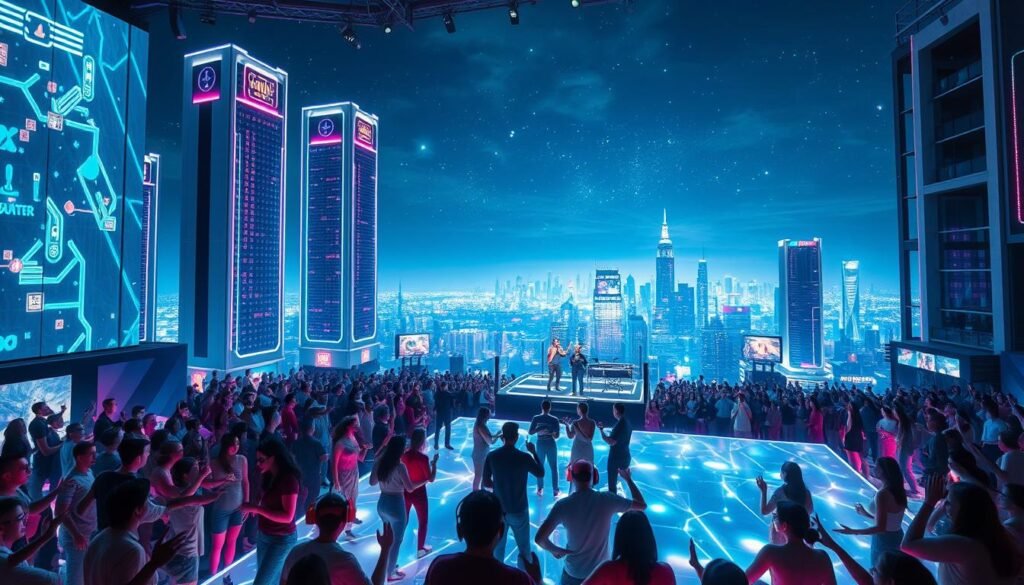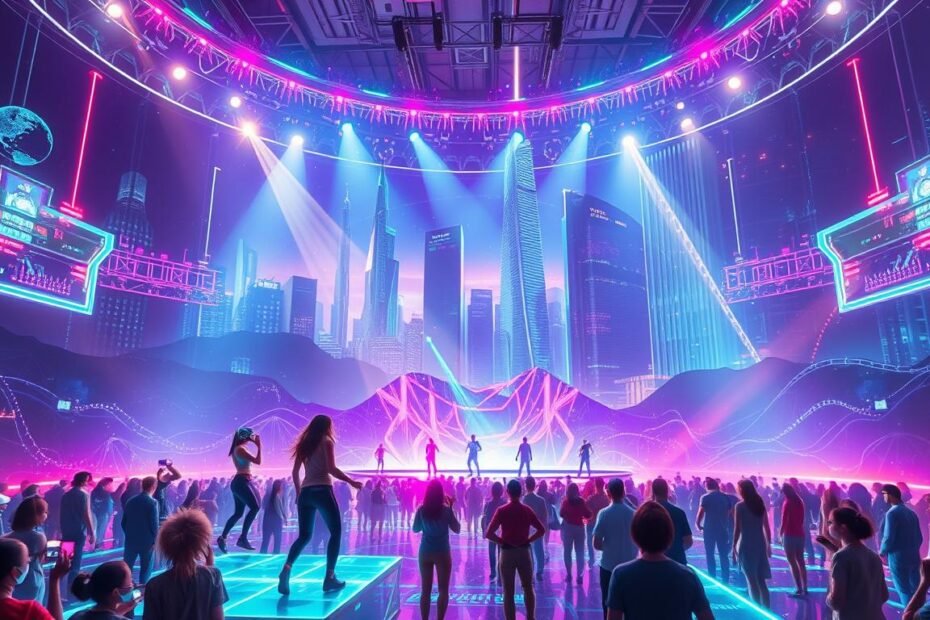The digital concert revolution has fundamentally altered the dynamics of live music. Artists are no longer confined to traditional venues; instead, they can reach global audiences in real time.
Technology has enabled artists to connect with fans worldwide, breaking geographical barriers and creating new opportunities for the music industry. This shift has given rise to virtual music events that are accessible to anyone with an internet connection.
Key Takeaways
- Virtual concerts have transformed the live music landscape.
- Artists can now reach a global audience in real-time.
- Technology has broken geographical barriers in the music industry.
- Virtual music events offer new opportunities for artists and fans.
- The digital concert revolution is changing the music industry dynamics.
The Evolution of Concert Experiences
The concert experience has undergone a significant transformation in recent years, driven by technological advancements. Virtual events have become a cornerstone of this digital revolution, providing a platform for artists to showcase their talents to a diverse and global audience.
The shift from traditional live shows to streaming events has been remarkable. Live streaming concerts have enabled artists to reach a broader audience, transcending geographical limitations. This shift has not only changed how we consume music but has also opened up new revenue streams for artists.
From Live Shows to Streaming Events
The transition to online music festivals and live streaming concerts has been driven by technological advancements. High-speed internet and improved streaming technologies have made it possible to deliver high-quality concert experiences online.
“The future of music is not just about the music itself, but about the experiences we create around it.”
The use of virtual reality (VR) and augmented reality (AR) has further enhanced the concert experience. These technologies have enabled the creation of immersive environments that simulate the excitement of live concerts.
How Technology Changed the Game
Technology has been a game-changer in the music industry, particularly in how concerts are experienced. The integration of VR and AR has enabled artists to create interactive and engaging experiences for their fans.
| Technology | Impact on Concert Experience |
|---|---|
| Virtual Reality (VR) | Immersive environments that simulate live concerts |
| Augmented Reality (AR) | Interactive experiences that enhance fan engagement |
| Live Streaming | Global reach and accessibility |
As technology continues to evolve, we can expect even more innovative concert experiences. The future of online music festivals and live streaming concerts looks promising, with technology playing a pivotal role in shaping the industry.
The Impact of the Pandemic on Live Events
The pandemic’s impact on live events was immediate and profound, accelerating the adoption of virtual platforms for music and entertainment. As governments enforced lockdowns and social distancing measures, the live music industry faced an unprecedented challenge.
Shifts in Audience Behavior
The pandemic led to a significant shift in audience behavior, with fans turning to digital music performances to satisfy their entertainment needs. This change was driven by the necessity to stay at home and the desire for new forms of engagement.
Key changes in audience behavior included:
- Increased demand for virtual entertainment experiences
- Greater engagement through live chats and social media
- A willingness to explore new platforms and technologies
The Role of Social Distancing
Social distancing measures played a crucial role in the rise of virtual concerts. With physical venues closed or operating at limited capacity, event organizers had to adapt to continue delivering live music experiences.
The impact of social distancing was multifaceted:
- It accelerated the development and adoption of virtual event technologies.
- It forced a reevaluation of traditional live event business models.
- It opened up new opportunities for artists to reach global audiences.
The Rise of Virtual Platforms
In response to the pandemic, virtual platforms emerged as a vital lifeline for the live music industry. These platforms enabled artists to perform and connect with fans remotely, ensuring the continuation of live music experiences in a digital format.
| Platform | Features | Benefits |
|---|---|---|
| YouTube Live | Live streaming, real-time comments | Wide reach, interactive |
| Facebook Live | Live video, integration with Facebook events | Large audience, easy sharing |
| Dedicated Virtual Festival Sites | Customized experiences, VR capabilities | Immersive experiences, tailored to specific events |
The rise of these platforms not only helped sustain the live music industry during a difficult period but also paved the way for future innovations in virtual entertainment experiences.
Popular Virtual Concert Platforms
Virtual concert platforms have revolutionized the way we experience live music. The digital landscape has seen a significant shift with the emergence of various online platforms that enable artists to connect with their audiences worldwide.
These platforms have not only changed the way concerts are held but have also opened up new avenues for virtual event production. They offer a range of features that enhance the online concert experience, making it more engaging and interactive.
Twitch and YouTube Live
Twitch and YouTube Live have become prominent players in the virtual concert scene. Twitch, initially known for gaming content, has expanded its scope to include live music streams, offering a unique space for artists to perform and interact with their fans through live chat and other interactive features.
YouTube Live, on the other hand, leverages the vast user base of YouTube, providing a platform for artists to reach a broader audience. Its integration with the main YouTube platform allows for easy discovery and viewing of live concerts.
Facebook Live and Instagram Concerts
Facebook Live and Instagram have also joined the fray, offering their own versions of virtual concert experiences. Facebook Live allows artists to stream concerts directly to their followers, fostering a sense of community and immediacy.
Instagram, with its visually-oriented platform, has become a hub for shorter, more curated live performances. Artists can use Instagram Live to share snippets of their performances, engage with fans, and create a buzz around their music.
Dedicated Virtual Festival Sites
Apart from the major social media and streaming platforms, dedicated virtual festival sites have emerged as significant players. These sites are specifically designed to host virtual festivals and concerts, offering a more tailored experience for both artists and attendees.
They often include features such as virtual stages, interactive chat rooms, and merchandise sales, creating a comprehensive virtual festival experience.
| Platform | Key Features | User Base |
|---|---|---|
| Twitch | Live streaming, interactive chat | Gaming and music enthusiasts |
| YouTube Live | Integration with YouTube, live streaming | Broad and diverse |
| Facebook Live | Direct streaming to followers, interactive features | Large social media user base |
| Instagram Live | Short-form live videos, interactive features | Visually-oriented audience |
| Dedicated Virtual Festival Sites | Virtual stages, chat rooms, merchandise sales | Festival and concert-goers |
The variety of online concert platforms available today has transformed the music industry, offering new ways for artists to reach and engage with their audiences. As technology continues to evolve, we can expect these platforms to become even more sophisticated, enhancing the virtual concert experience.
Key Features of Virtual Concerts

Virtual concerts are redefining the music landscape with their innovative features. These events offer a unique blend of technology and entertainment, enhancing the overall experience for attendees.
Immersive Experiences with VR
One of the standout features of virtual concerts is the use of Virtual Reality (VR) technology to create immersive experiences. By donning VR headsets, viewers can feel as though they are part of the concert, enjoying a 360-degree view of the performance. This technology has the potential to revolutionize the way we experience live music, making it feel more intimate and engaging.
Interactivity through Live Chat
Virtual concerts also offer a high level of interactivity through live chat and other engagement tools. Fans can interact with the artists, share their experiences with other attendees, and participate in real-time polls or Q&A sessions. This interactivity enhances the sense of community and connection among viewers, making the event feel more dynamic and inclusive.
Accessibility for All Audiences
Another significant advantage of virtual concerts is their accessibility. Without the need to travel to a physical venue, people from all over the world can attend concerts and festivals, regardless of their geographical location or mobility. This opens up new opportunities for fans who may have previously been unable to attend live events due to various constraints.
Furthermore, virtual concerts can be made more accessible through features such as subtitles, sign language interpretation, and adjustable audio settings, catering to a diverse range of needs and preferences.
Success Stories in Virtual Concerts
Virtual concerts have revolutionized the music industry, providing unforgettable experiences for both artists and audiences alike. This new format has not only changed how we consume music but has also opened up new avenues for artists to connect with their fans worldwide.
Major Artists Embracing the Change
Numerous renowned artists have successfully transitioned to virtual concerts, leveraging technology to deliver high-quality performances. Artists like Billie Eilish and Kendrick Lamar have used virtual platforms to reach a broader audience, showcasing the potential of digital music events.
The adoption of virtual concert platforms by major artists has been a significant factor in their success. These platforms have enabled artists to perform from anywhere in the world, reducing logistical challenges and increasing their global reach.
Viral Moments and Memorable Events
Virtual concerts have given rise to numerous viral moments and memorable events, further cementing their place in the music industry. For instance, Travis Scott’s Fortnite concert drew millions of viewers, setting a new benchmark for virtual events.
| Artist | Event | Viewership |
|---|---|---|
| Travis Scott | Fortnite Concert | 12 million+ |
| Billie Eilish | Live from the 2020 Grammy’s | 4.7 million+ |
| Kendrick Lamar | DAMN. Virtual Concert | 2 million+ |
The success of these events demonstrates the growing popularity and potential of virtual concerts. As technology continues to evolve, we can expect even more innovative and engaging digital music performances.
The Business Perspective
The shift to digital festivals has brought about a paradigm change in how music events are monetized. Virtual concerts offer new revenue streams through innovative models, sponsorships, and brand collaborations, often with greater cost-effectiveness than traditional live events.
Revenue Models for Digital Festivals
Digital festivals have introduced various revenue models, including ticket sales for virtual events, exclusive content offerings, and merchandise sales. For instance, some platforms offer tiered ticket pricing, with premium experiences available at higher price points.
| Revenue Model | Description | Benefits |
|---|---|---|
| Ticket Sales | Sales of tickets for virtual events | Direct revenue stream |
| Exclusive Content | Offering exclusive content to ticket holders | Increased perceived value |
| Merchandise Sales | Selling branded merchandise during events | Additional revenue stream |
Sponsorship and Brand Collaboration
Sponsorship deals and brand collaborations have become crucial for the financial success of digital festivals. Brands are eager to reach the engaged audiences that these events attract.
Key benefits of sponsorship include:
- Increased brand visibility
- Targeted marketing opportunities
- Enhanced brand credibility through association with popular artists
Cost-Effectiveness Compared to Live Events
One of the significant advantages of digital festivals is their cost-effectiveness compared to traditional live events. Savings are realized through reduced venue costs, lower logistical expenses, and the ability to reach a global audience without the need for multiple physical locations.
The cost savings can be substantial, allowing organizers to allocate more resources to enhancing the virtual experience, such as investing in better streaming technology or creating more engaging content.
Challenges Facing Virtual Concerts
While virtual concerts offer many benefits, they also present a unique set of challenges that must be overcome. The shift to online events has been rapid, and despite the potential of live streaming concerts, several issues have arisen that impact the overall experience.
Technical Issues and Connectivity Problems
One of the primary concerns with virtual concerts is the reliance on technology. Technical issues such as lag, buffering, and poor video quality can significantly detract from the experience. Moreover, connectivity problems can prevent some attendees from participating fully. Ensuring a stable and fast connection is crucial for online concert platforms.
To mitigate these issues, organizers are investing in better infrastructure and conducting thorough tests before events. However, the variability in internet connectivity among attendees remains a challenge.
Audience Engagement and Retention
Maintaining audience engagement is another significant challenge. Unlike live events, where the atmosphere and energy are palpable, virtual concerts can sometimes feel isolating. Organizers are exploring ways to make online events more interactive, such as through live chat features and Q&A sessions.
To keep the audience engaged, some platforms are incorporating elements like virtual meet-and-greets and exclusive content available only to online attendees. These features aim to enhance the overall experience and encourage audience retention.
Quality of Experience vs. Live Events
Comparing the quality of experience between virtual and live concerts is inevitable. While live events offer a unique, communal experience, virtual concerts provide accessibility and convenience. The table below highlights some key differences:
| Aspect | Live Events | Virtual Concerts |
|---|---|---|
| Atmosphere | Immersive, communal | Variable, dependent on viewer setup |
| Accessibility | Limited by venue capacity | High, global reach |
| Interactivity | Direct interaction with performers | Dependent on technology, e.g., live chat |
Ultimately, both formats have their advantages, and the choice between them depends on individual preferences and circumstances.
Future Trends in Virtual Concerts

The future of virtual concerts holds much promise, with emerging trends set to revolutionize the way we experience live music. As technology continues to advance, the possibilities for creating immersive and engaging virtual entertainment experiences are expanding.
Hybrid Models: Combining Live and Virtual
One of the significant trends shaping the future of virtual concerts is the adoption of hybrid models. These models combine the best of both worlds by integrating live performances with virtual elements. This approach allows artists to reach a broader audience, including those who cannot attend live shows due to geographical or other constraints.
Key benefits of hybrid models include increased accessibility and the potential for enhanced fan engagement through interactive virtual experiences. By leveraging technologies like augmented reality (AR) and virtual reality (VR), artists can create unique and memorable experiences that complement their live performances.
The Rise of NFTs in Music
Another trend gaining traction in the virtual concert landscape is the use of Non-Fungible Tokens (NFTs) in music. NFTs offer a new way for artists to monetize their work and connect with fans. By creating unique digital assets, artists can provide exclusive content and experiences to their supporters.
The integration of NFTs in music is expected to grow, with potential applications including limited edition digital collectibles, exclusive access to virtual events, and even virtual real estate within online music environments. This trend is part of the broader phenomenon known as The Rise of Virtual Concerts and Digital Festivals, where technology is redefining the music industry.
Conclusion: The New Age of Music Events
The rise of virtual concerts signifies a lasting change in the music industry, with technology playing a crucial role in shaping the future of music events. As we’ve seen, digital music performances have become increasingly popular, offering immersive experiences that transcend geographical boundaries.
Shaping the Future of Music
Virtual music events have opened up new avenues for artists to connect with their audiences, creating innovative and engaging experiences. The music industry’s shift towards virtual events is expected to continue, with hybrid models combining live and virtual elements.
Embracing Innovation
To stay ahead, the music industry must embrace technology, leveraging it to create unique digital music performances. By doing so, the industry can ensure that virtual music events continue to thrive, offering fans unforgettable experiences.
FAQ
What are virtual concerts and digital festivals?
Virtual concerts and digital festivals are online events that allow artists to perform and connect with fans remotely, often through live streaming or pre-recorded content.
How have virtual concerts changed the music industry?
Virtual concerts have expanded the reach of artists, enabled new forms of interaction between artists and fans, and provided a more accessible and inclusive experience for diverse audiences.
What role did the pandemic play in the rise of virtual concerts?
The pandemic accelerated the adoption of virtual concerts as a response to social distancing measures and the cancellation of live events, forcing the music industry to adapt and innovate.
What are some popular platforms for virtual concerts?
Popular platforms for virtual concerts include Twitch, YouTube Live, Facebook Live, and dedicated virtual festival sites, which offer a range of features and tools to facilitate online events.
How do virtual concerts provide immersive experiences?
Virtual concerts can provide immersive experiences through the use of virtual reality (VR) and augmented reality (AR) technologies, which can transport fans into the concert environment.
Can virtual concerts be as engaging as live events?
While virtual concerts face challenges in replicating the energy of live events, they can still be highly engaging through interactivity, live chat, and other engagement tools that foster a sense of community.
What are the business benefits of virtual concerts?
Virtual concerts offer a range of business benefits, including new revenue models, sponsorship opportunities, and cost-effectiveness compared to traditional live events.
What are some challenges facing virtual concerts?
Virtual concerts face challenges such as technical issues, connectivity problems, and sustaining audience engagement, as well as comparisons with the quality of experience offered by live events.
What is the future of virtual concerts?
The future of virtual concerts is likely to involve hybrid models that combine live and virtual elements, as well as emerging technologies like NFTs, which can create new opportunities for artists and fans.
How can I attend a virtual concert?
To attend a virtual concert, you can typically purchase tickets or access passes through the event’s website or a designated platform, and then follow the instructions to join the live stream or virtual experience.
